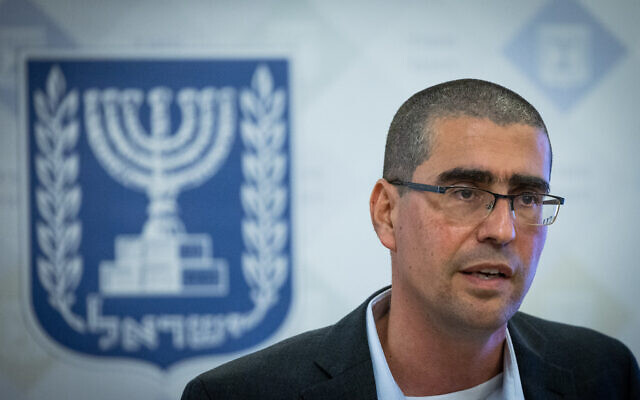Finance Ministry official Kobi Bar-Nathan vows to do ‘everything in our power’ to avoid a strike on September 1

A senior treasury official said Sunday morning that the Finance Ministry was looking into the possibility of forcing teachers to return to school on September 1 via court order if negotiations fail.
In an interview with Army Radio, commissioner of wages at the Finance Ministry Kobi Bar-Nathan said negotiations were seeing “ups and downs.”
“I was sure we would be in a much better place by now,” he said. “That’s why we’re looking into the possibility of using injunctions. We’re doing everything in our power so the school year can start properly.”
Talks aimed at averting threatened strike action by the Israel Teachers Union at the beginning of the upcoming school year have failed to reach a conclusion for months.
With schools set to open later this week, political leaders have taken an active role in the issue, with Prime Minister Yair Lapid holding talks last week with Finance Minister Avigdor Liberman, Education Minister Yifat Shasha-Bito, Israel Teachers Union head Yaffa Ben David and National Parents Association chair Merom Shiff in an effort to find a solution to the months-long crisis.
Negotiations for a new agreement are said to be stuck over a union demand that a system determining salary hikes based on rank and seniority remain in place, rather than a system that would shift some of those raises onto newer teachers and those who excel at their work.
במסגרת ההכנות לפתיחת שנת הלימודים תשפ"ג נפגשתי עם שר האוצר @AvigdorLiberman. דנו בסוגיות העומדות על הפרק ובדרכים בהן ניתן למצוא פתרונות לפתיחת שנת הלימודים הקרובה, כסדרה ובמועדה. pic.twitter.com/qTM5OFc51W
— יאיר לפיד – Yair Lapid (@yairlapid) August 21, 2022
The Finance Ministry is proposing that new teachers get a 35 percent raise, while veteran teachers receive just a 3% hike.
Liberman’s plan also includes increasing the number of working days for teachers in a bid to help working parents. He also wants to provide more flexibility to school principals by allowing them to offer raises to outstanding teachers in order to incentivize excellence within the profession.
“The emphasis of the Teachers’ Union is on seniority, and at the Finance Ministry the emphasis is on excellence,” Liberman said last week.
The union, which represents daycare, kindergarten, and elementary school teachers, has rejected all proposals, accusing the ministry at one point of “manipulating the numbers” in its favor and deepening the crisis. Along with the Education Ministry, it has warned that the wage plan will result in a mass exodus of teachers in five-to-six years’ time.

Liberman was publicly resistant to the premier stepping in to deal with the crisis, suggesting that the move was political in nature — elections are scheduled for November 1, and parents unable to send their kids to school may take out their frustrations at the ballot box — and saying politicians should “leave the management of negotiations to professional ranks only.”
“I made it clear in a meeting with the prime minister and education minister that only the person in charge of salaries at the Finance Ministry is the one who manages negotiations on salary agreements,” he said in a statement last week.
The government has limited wriggle room with what it can offer the teachers. As a caretaker government, the attorney general has capped what the Finance Ministry can offer teachers to NIS 4 billion ($1.2 billion) in the lead-up to elections.
Ben David, meanwhile, has warned of “chaos” on September 1 if talks fail.
Treasury officials and Teachers Union representatives are set to meet later Sunday in an effort to reach an understanding.
As reported by The Times of Israel
